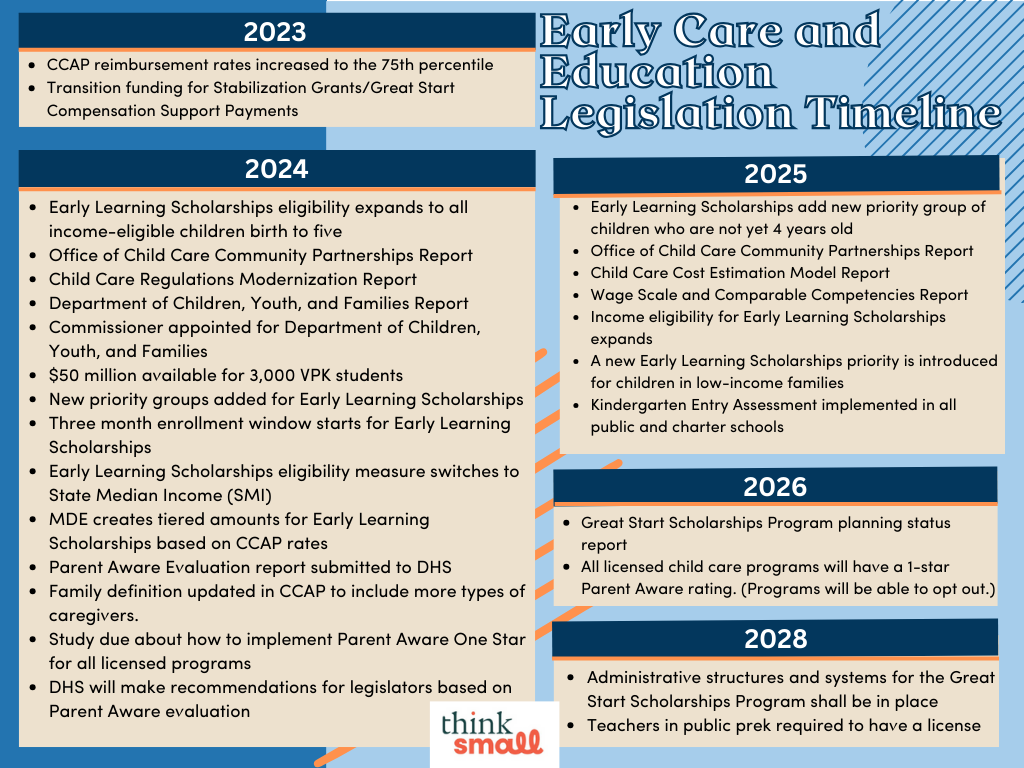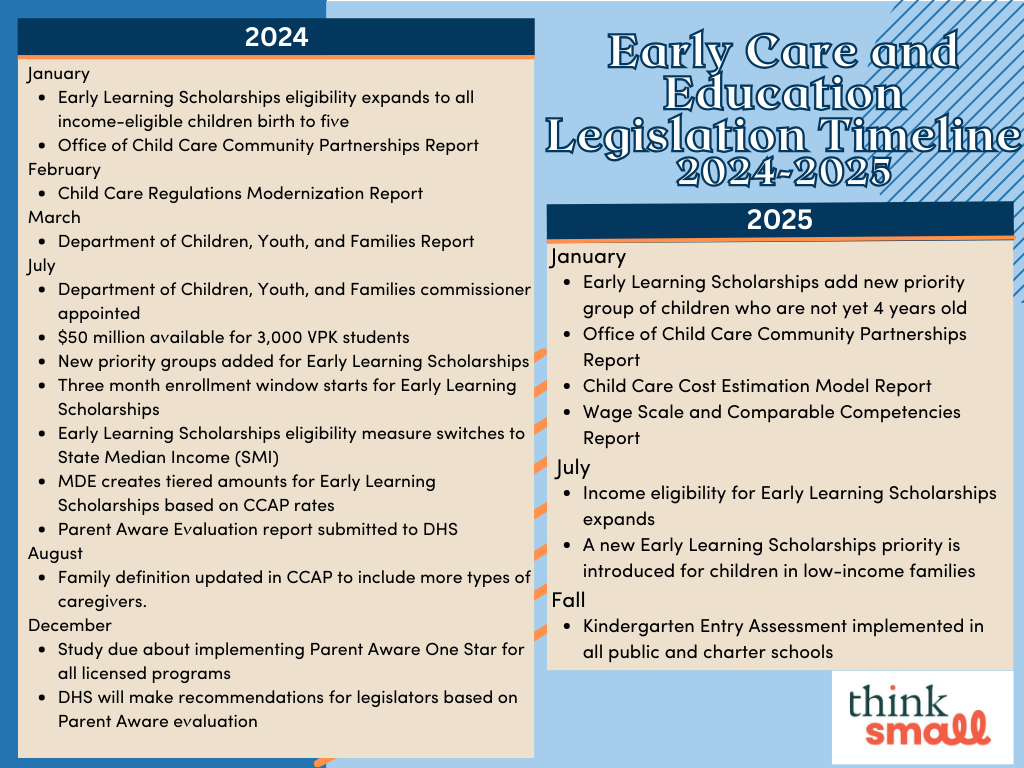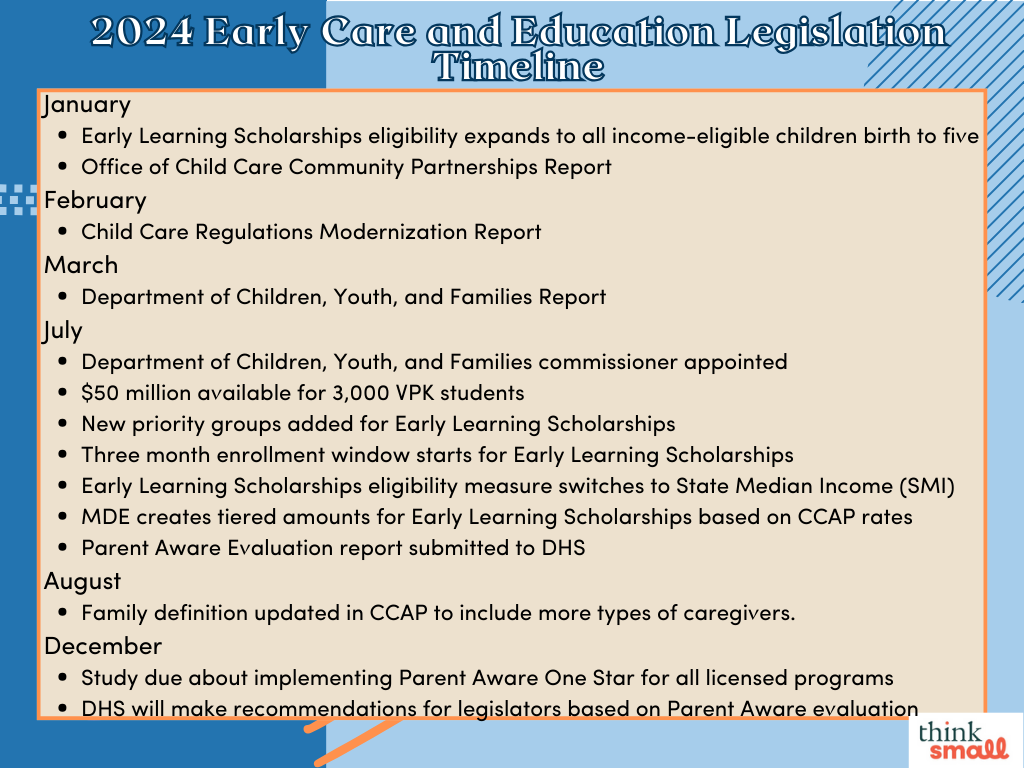Many changes to early care and education policy passed this legislative session. In an attempt to organize and track the milestones ahead, we’ve created this blog post and accompanying graphic. If you see something that needs to be added or corrected, let us know!! Email policy@thinksmall.org.
What’s included in this list?
Major policy changes, reports, and other implementation steps for:
- Early Learning Scholarships
- Child Care Assistance Program
- Department of Children, Youth, and Families
- Parent Aware Evaluation Project
- Great Start Scholarships
- Early Childhood Workforce Reports
- Child Care Regulation Modernization Project
- Voluntary Pre-kindergarten
What’s not included?
- Paid Family Leave
- Child Care Licensing (except for regulation modernization)
- Funding (for the most part). New funds usually becomes available at the beginning of the state‘s fiscal year, July 1.
What is an effective date?
Sometimes pieces of legislation include effective dates. These are instructions as to when changes should happen. An effective date is sort of like a due date—the time by which the change should be implemented. Effective dates can cover an entire program, or there can be different dates for each part of the program. Sometimes the change may be completed ahead of schedule. And sometimes the change may start to be rolled out by the effective date but then take longer to be in full effect.
Occasionally, agency staff implementing the program will go back to legislators and ask for changes to the effective date, usually because they need more time. So, while these dates are important markers into when various pieces will be in place, it’s also important to keep in mind that it is a part of a process that includes adjustments along the way.

If changes are scheduled to happen on different days in the same month, the day of the change is listed at the beginning of the line. (e.g. 30-Report due on child care cost estimation model is for January 30, 2025).
October 30, 2023
- UPDATE October 2023: Rates have been announced!
- Child Care Assistance Program (CCAP) provider reimbursement rates increased to the 75th percentile of 2021 rates
December 2023
- UPDATE October 2023: Great Start Compensation Support Payment amounts and requirements announced
- Transition funding for stabilization grants ends. It may end before that if the new Great Start Compensation Support Payments program is already in place.

January 2024
- 1-Early Learning Scholarships eligibility expands to all income-eligible children birth to give
- 15-Report from Office of Child Care Community Partnerships (due annually)
February 1, 2024
- DHS will submit a report and proposed legislation to the legislature based on results from Child Care Regulations Modernization Projects
March 1, 2024
- Report due on Department of Children, Youth, and Families
July 2024
- 1-Commissioner for Department of Children, Youth, and Families to be appointed
- 1-$50 million available for 3,000 Voluntary Prekindergarten students
- 1-Early Learning Scholarships add new priority groups of children who
- Have an incarcerated parent
- Have a parent in a substance use treatment program
- Have a parent in a mental health treatment program
- Have experienced domestic violence
- Are need of child protective services regardless of family income
- 1-Families will have to enroll in an early learning program within 3 months of being approved for an Early Learning Scholarship, with the opportunity to apply for an extension if necessary.
- 1-The Minnesota Department of Education (MDE) will create a schedule of tiered Early Learning Scholarship amounts based on the market rate survey conducted for the Child Care Assistance Program (CCAP). Early Learning Scholarship amounts for low-income and priority children in 4-Star programs will have to, at a minimum, pay amounts that align to the 75th percentile of market rates.
- 1-The measure of family income eligibility for Early Learning Scholarships switches from 185% of the Federal Poverty Guideline to 47% of State Median Income to align with CCAP
- Parent Aware evaluation report submitted to DHS
August 25, 2024
- Family definition updated in the Child Care Assistance Program to include more types of caregivers
December 2024
- 31-Study due about how to implement Parent Aware One Star for all licensed programs
- DHS will make recommendations for legislators based on Parent Aware evaluation

January 2025
- 1-Early Learning Scholarships add new priority group of children who are not yet 4 years old
- 15- Report from the Office of Child Care Community Partnerships
- 30-Report due on child care cost estimation model
- 30-Report due on wage scale and comparable competencies
- 30-Report on Cost Estimation Model due
- 30-Wage Scale/Comparable Competencies due
July 1, 2025
- The income eligibility for Early Learning Scholarships expands from 47% of State Median Income to 85% of State Median Income
- A new Early Learning Scholarships priority is introduced for children in low-income families, with children in low-income families and existing priority groups receiving the highest priority
Fall 2025
- Kindergarten Entry Assessment will be implemented in all public and charter schools. This will be phased in across the state over three school years, with all public schools complying by the 2025-2026 school year.
July 1, 2026
- Report due on status of planning for the Great Start Scholarships Program
- All licensed child care programs will have a 1-star Parent Aware rating. Programs will be able to opt out of the new structure.
July 1, 2028
- Administrative structures and systems for the Great Start Scholarships Program shall be in place
- Teachers in public prek must have a license. This does not apply to educators working in a child care center. Teachers who have taught least 5 years in a qualifying program before September 1 2028 are exempt.
By Marie Huey, Public Policy and Advocacy Staff Leader







